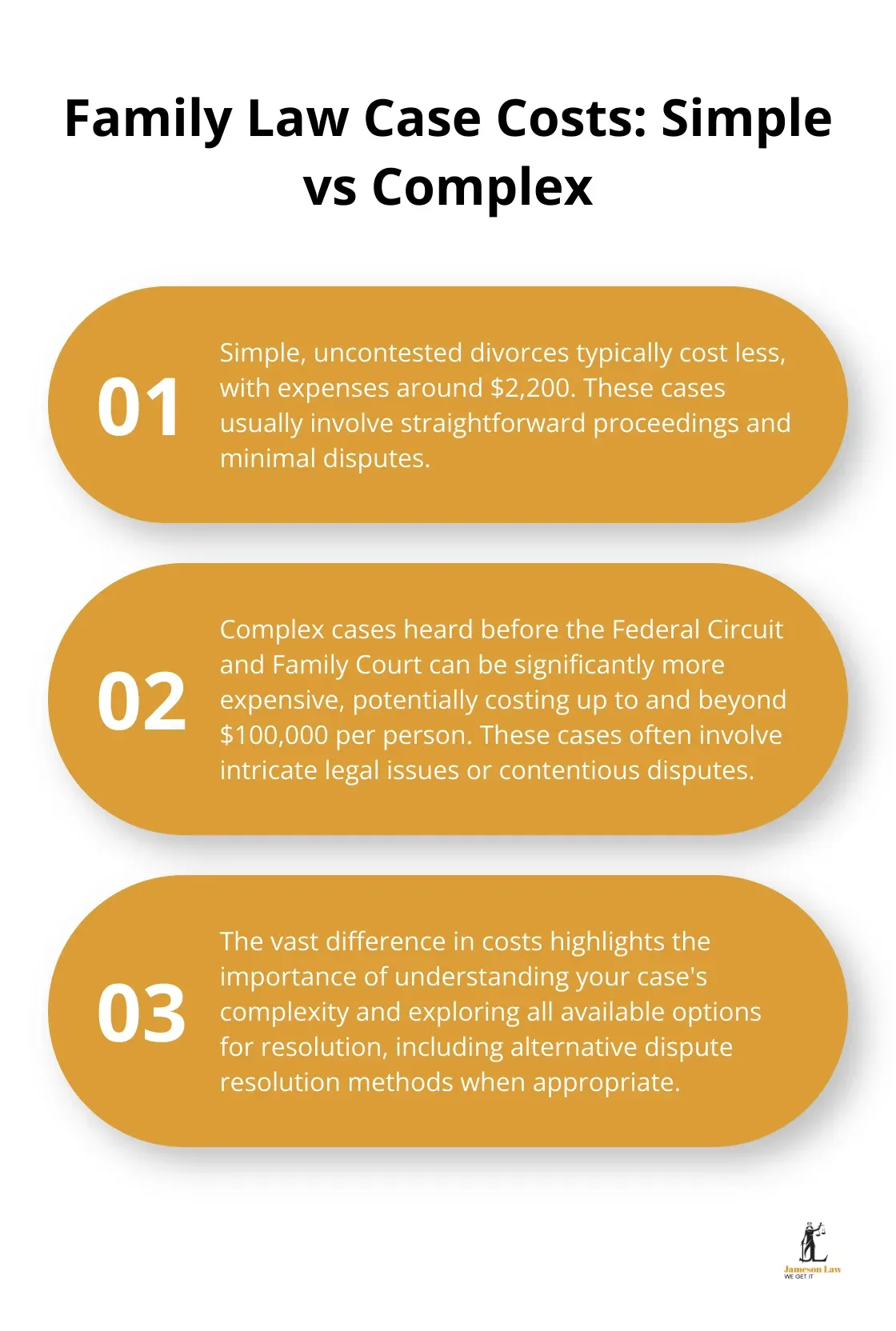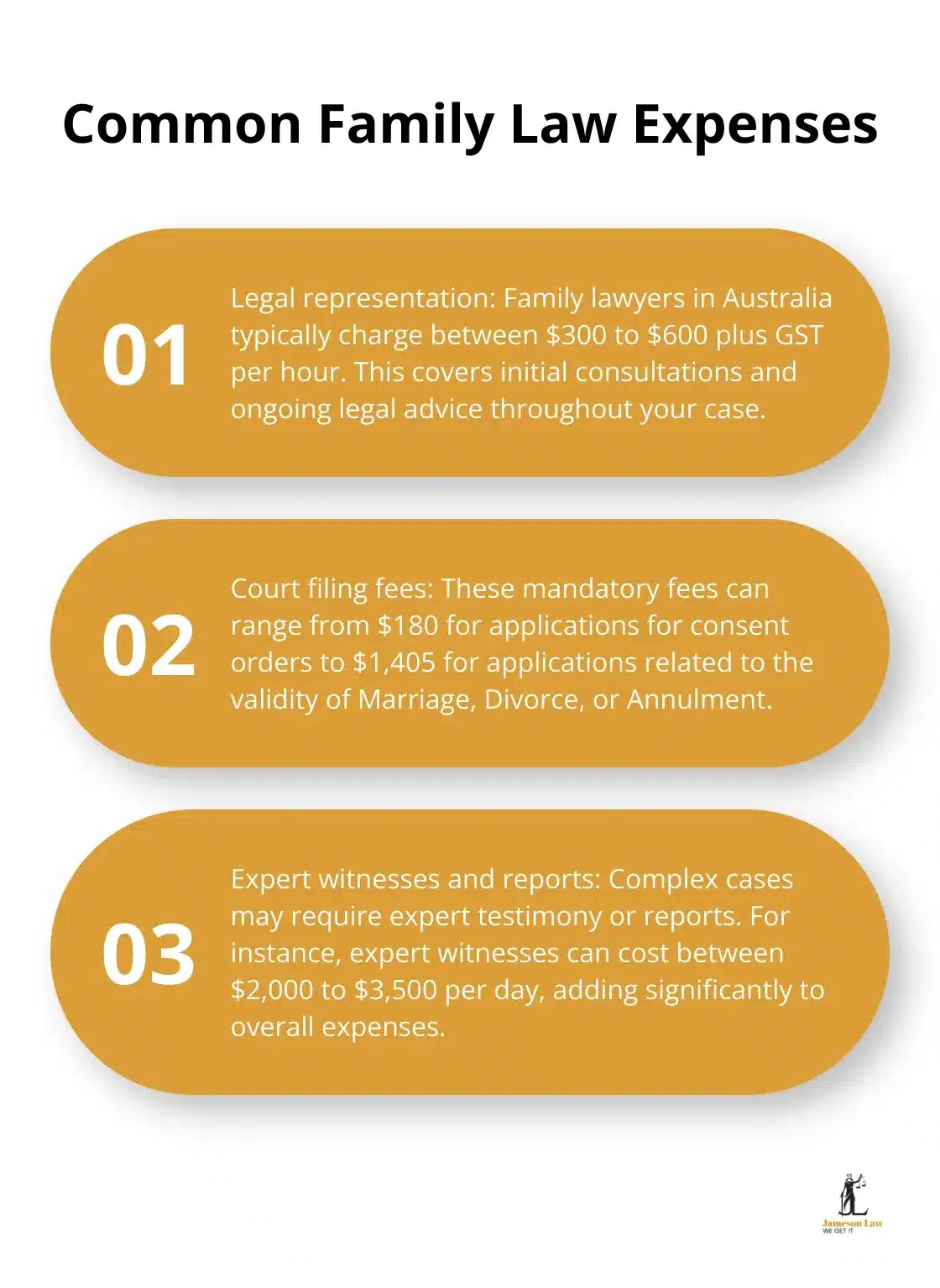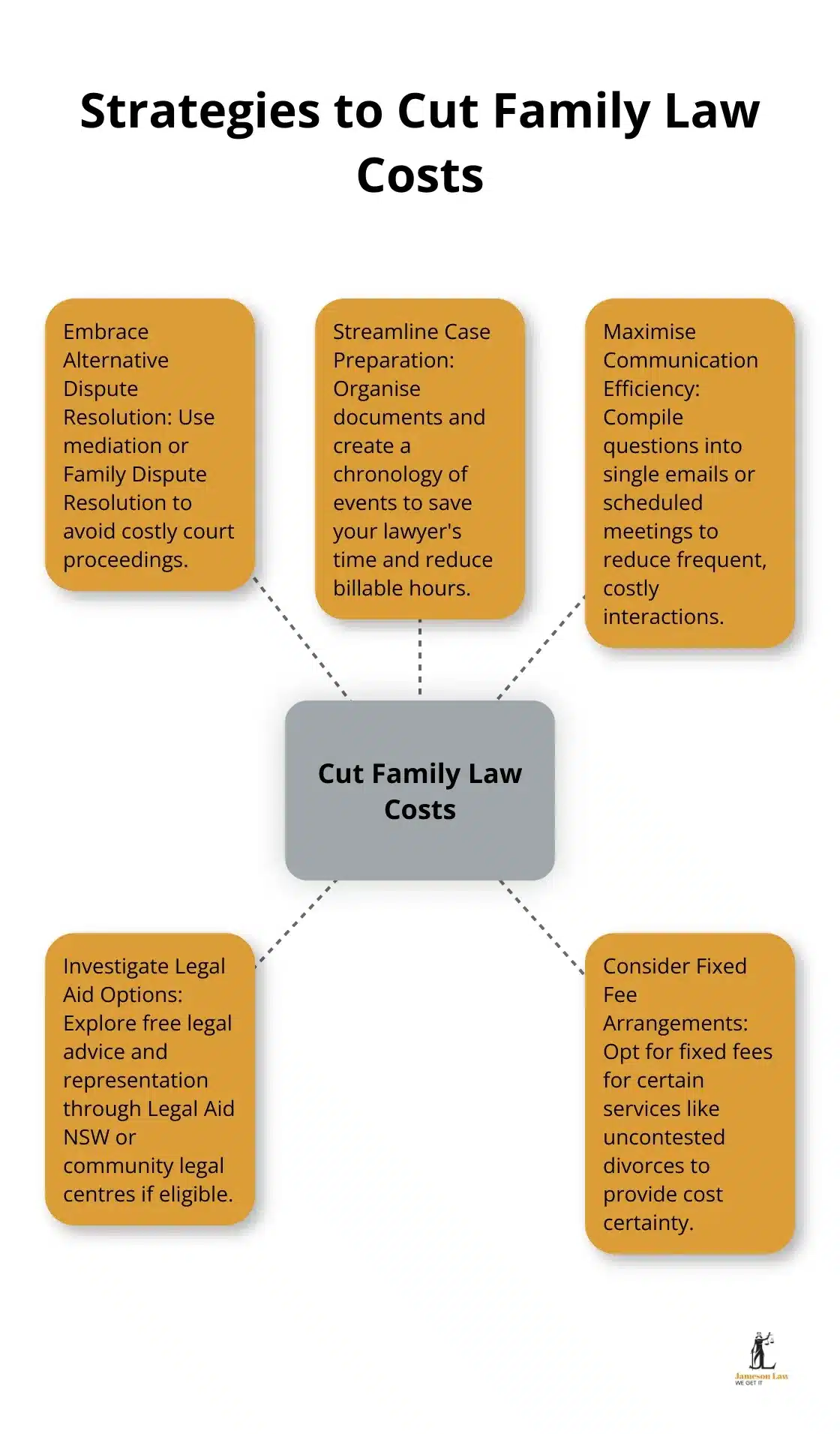Family law costs can be a significant concern for people navigating matters like divorce, parenting arrangements, or property settlements. At Jameson Law, we value transparency about legal expenses and how fees are managed in Sydney.
This blog post breaks down the main factors that influence family law costs and gives practical tips to manage these expenses effectively. By understanding what to expect, you will be better placed to make informed decisions throughout your legal journey in NSW.
What Drives Family Law Costs?
Case Complexity
The complexity of your matter has a major impact on family law costs. Simple, uncontested divorces usually cost less than disputes involving parenting or complex property pools. As a guide, a straightforward application for divorce can be prepared on a fixed fee in some situations, while defended parenting and property proceedings in the Federal Circuit and Family Court of Australia can become expensive if they proceed to multiple interim hearings and a final hearing.

Time and Duration
The length of negotiations and court timetables directly affects the total bill. A quick settlement might involve 5 to 10 hours of legal work. A defended case can require 50 hours or more. To understand how filing steps and court events add up, see the court’s overview of parenting and property pathways, and the current schedule of family law fees.
Lawyer’s Expertise
More experienced solicitors usually charge higher hourly rates, but their efficiency and strategy can reduce overall time. In practice, a senior solicitor who resolves a matter quickly may deliver similar or better total cost than a lower hourly rate that takes twice as long. You can check a solicitor’s standing via the Law Society of NSW Register of Solicitors.
Geographic Location
Rates vary by region. Major cities such as Sydney commonly attract higher hourly rates than regional centres due to complexity, demand and overheads. If you are comparing quotes, ask for a clear written scope so you can weigh value rather than price alone. See the ACCC guidance on quotes, estimates and invoices.
Court and Administrative Fees
Disbursements add to the total. Key items include court filing fees, process server fees, and expert reports. The FCFCOA publishes the official list of Family Law fees. Where GST applies, see the ATO’s overview of GST for businesses. Expert witnesses, such as valuers or psychologists, set their own rates that reflect qualifications and time.
Understanding these factors will help you plan for the financial side of your case. Seek clear estimates and explore ways to manage expenses when choosing legal representation. If you need to speak to our Sydney team, call (02) 8806 0866 or contact us.
Now that we have covered the main cost drivers, here are the common expenses you may encounter in a family law matter.
Common Family Law Expenses
Family law proceedings can involve a range of expenses. Understanding these upfront helps with budgeting and reduces surprises. Below are typical cost categories you may see in Sydney family law matters.

Initial Consultation and Legal Representation
Most firms charge by the hour for ongoing work, with some offering fixed fees for discrete tasks like an application for divorce or consent orders. Ask for written scopes and a costs agreement so you know what is included. You can also review general guidance on paying for legal services via Moneysmart.
Court Filing Fees
Filing fees are set by regulation and change periodically. The current amounts are published by the court: Family Law fees. If you are on a low income or facing hardship, the court has information about fee reductions and exemptions on the same page.
Expert Witness and Report Costs
More complex disputes may require expert input. Common examples include:
- Property and business valuations
- Forensic accountant reports
- Family reports or child impact reports
Reports ordered by the court follow the court’s practice directions and may attract separate fees set by the expert.
Mediation and Alternative Dispute Resolution
Mediation is often more cost effective than litigating every issue. For parenting matters, Family Dispute Resolution is commonly required before filing. Learn more through Relationships Australia NSW and the court’s page on Dispute Resolution. Many services use sliding scale fees.
For broader financial planning during separation, see Moneysmart. For child support information, visit Services Australia – Child Support.
Next, we look at proven ways to reduce family law costs while keeping your matter moving.
How to Cut Family Law Costs

Embrace Alternative Dispute Resolution
ADR methods like mediation can significantly reduce legal spend by narrowing issues early. The Law Society of NSW explains when it is suitable to mediate or litigate. The court also outlines Family Dispute Resolution pathways. Ask your solicitor which forum best fits your situation.
Streamline Your Case Preparation
Good preparation saves hours. Before your conference, gather bank statements, superannuation records, valuations and relevant emails. Keep a simple chronology of events to speed up drafting. Clear bundles and timelines reduce duplication and keep your costs down.
Maximise Communication Efficiency
Group non-urgent questions into one email or a scheduled call. Keep documents in a shared folder with logical filenames. Agree up front how you prefer to receive updates. These small habits cut billable time and improve progress.
Investigate Legal Aid and Community Support
If you are experiencing hardship, check your eligibility with Legal Aid NSW. Community Legal Centres NSW also lists free and low-cost help across the state: clcnsw.org.au. For emotional support while your case is on foot, you can contact Beyond Blue or the Family Relationship Advice Line.
Consider Fixed Fee Arrangements
Fixed fees provide cost certainty for defined tasks. Many Sydney firms, including Jameson Law, offer fixed-fee options for suitable services like divorce applications or consent orders. Always confirm what is included in writing and how any out-of-scope work will be billed.
Final Thoughts
Family law costs are driven by complexity, duration, and the level of expert input. You can manage expenses through early negotiation, clear communication, organised documents and the smart use of ADR. Open conversations about costs with your solicitor will help you budget and avoid surprises.
At Jameson Law, we provide transparent, cost-effective family law services in Sydney. Call (02) 8806 0866 or book a consultation to discuss fixed-fee options and strategies tailored to your situation.
A balanced plan uses reputable resources and clear steps. Useful links include the Family Law Act 1975, the court’s Family Law hub, Moneysmart, Child Support, the NSW Solicitor Register and Relationships Australia NSW. With careful planning and the right legal support, you can move forward confidently.













